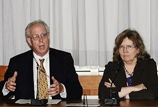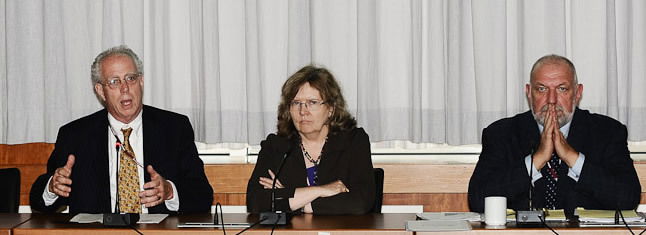GPC 2009 Project presented at Bonn Side Event

Global Policy Coherence 2009: Governance- Climate, Finance, Trade
10 June 2009 - Bonn
The Global Policy Coherence 2009 Project was introduced on 10 June, at a side event of the Bonn climate negotiations. The complexities of cooperation among government ministries on climate change and its relationship to economic arenas were highlighted. It was underscored that a successful climate solution will necessarily require change to financial and trade practices.
 L-R: Harris Gleckman, IES; Melinda Kimble, UN Foundation; and Tom Spencer, IES
L-R: Harris Gleckman, IES; Melinda Kimble, UN Foundation; and Tom Spencer, IES
Report by ENB - The Earth Negotiations Bulletin:
This panel discussed policy recommendations to ensure coherence between climate change, trade and financial regimes.
Stressing the need for pragmatic solutions, Tom Spencer, IES, highlighted a lack of sufficient coherence on policy issues related to trade, finance and climate change. He said incoherence costs lives and is damaging to international negotiations, adding that policy goals could be achieved more easily if we had coherent governments.
Harris Gleckman, IES, discussed the complexities of cooperation among government ministries on climate change and its relationship to economic arenas. He underscored that a successful climate solution will necessarily require changes to financial and trade practices.
Melinda Kimble, UN Foundation, said World Trade Organization’s (WTO) negotiations have taken on a “new urgency,” and this is directly linked to the fact that trade is one of the tools available to re-stimulate and inflate the global economic system. She explained that while the climate negotiations are also urgent, governments spend relatively few resources on them. She said the coherence discussion is very important but given the current focus on the trade agenda and the slow progress in Bonn, it will be very hard to synchronize these processes at this time.
Participants discussed, inter alia: challenges with mainstreaming climate change policies; conflict between intellectual property rights and the needs of developing countries for technology transfer; impacts of the WTO’s Doha round of negotiations on the global climate change negotiations; examples of coordination between ministries at the domestic level in Germany, Sweden, Costa Rica, China and the UK; greening of export credit agencies; and the possible correlation between inter-ministerial tensions and non-federal state structures.
>> Read more about the GPC project and related events